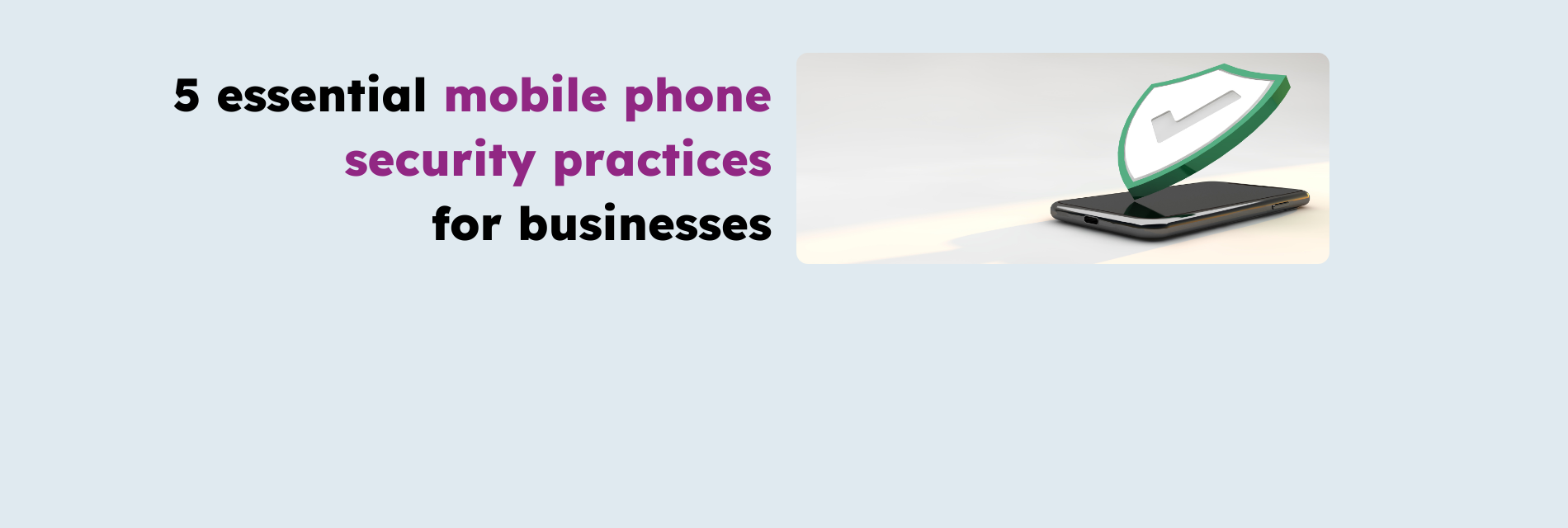
Article
5 Essential Mobile Phone Security Practices for Businesses
In an era where mobile devices are indispensable tools for businesses, ensuring their security is paramount. With the increasing prevalence of cyber threats, safeguarding sensitive information and maintaining a resilient defense posture against evolving risks have become crucial. This article explores the mobile threat landscape and outlines five essential mobile phone security practices for businesses to adopt.
Understanding the Mobile Threat Landscape
The landscape of mobile security threats is vast and dynamic, posing significant risks to businesses. Malware and phishing attacks, device theft and loss, and unsecured Wi-Fi networks are among the prevalent threats.
Malicious attacks, particularly phishing attempts, have become common. According to Cyber Security Breaches Survey 2022, of the 39% of UK businesses who identified an attack, the most common threat was phishing attempts (83%). Of the 39%, around one in five (21%) identified a more sophisticated attack type such as a denial of service, malware, or ransomware attack.
Device theft and loss are also prevalent, with over 196,000 reported cases of personal mobile device theft in England and Wales from April 2022 to March 2023. The Prey Project's Mobile Theft and Loss Report indicates that over 60% of incidents involve misplaced devices, highlighting the need for robust security measures to mitigate any unforeseen circumstances.
Unsecured Wi-Fi networks present another significant risk. With 35% of people accessing public Wi-Fi three to four times a month, the exposure to potential threats is substantial, where hackers can intercept and retrieve important data. Recognizing and addressing these specific threats is paramount for businesses operating in mobile environments.
Best Mobile Security Practices for Businesses
Use Mobile Device Management (MDM) features to your advantage
Implementing an MDM solution is fundamental for securing mobile devices within a business. These platforms offer centralized control and extensive capabilities, including provisioning, configuration, and monitoring. Security is also a crucial element for MDM where key features include:
- device encryption, a vital feature where sensitive data is secure
- complex password settings and enforcement
- network access controls, to regulate end–users from falling into malicious traps via unprotected internet access
- remote locate and wipe functionalities, ensuring that if anything goes wrong, there’s swift immediate action to reduce repercussions
Enforce Strong Password Policies
IT administrators should also encourage and enforce the use of complex passwords, avoiding easily guessable combinations. MDM tools can enforce regular password updates and provide options for using password managers. Implementing multi-factor authentication also reduces the risk of unauthorized access. MFA comes in multiple ways, including:
- Time based One-Time Passwords (OTP)
- Biometric authentication including fingerprint & face identification
- Traditional MFA, where a user receives a code from a secondary device to include with their password.
Regularly Deploy Software Updates and Security Patches
Timely updates are crucial for a business to stand against the latest virus and malware threats. Google, Apple, and other OEMs provide their own security patches to their supported devices; however, each company has their own level of frequency of patches deployed within a certain time period. This can lead to vulnerabilities in a business’s fleet being exposed to immediate threats. With over 450,000 new malicious programs registered daily, businesses must ensure their devices receive the latest security patches.
Automation of update processes via MDM tools enhances efficiency and helps in maintaining a robust security posture.
Train employees on the latest preventive measures
Educating employees on the best practices for security is crucial. Regular training events can empower employees, contributing to an overall security-conscious workplace. Employees should be trained on:
- recognizing phishing attacks by email and SMS messages, including ways to identify a verified & authentic sender
- being cautious in sending passwords and account details through unencrypted communication channels
- implementing an extra layer of protection with MFA procedures
- avoiding personal details being given over the phone from suspected scam calls
- reporting any suspicious incidents
Proper Wi-Fi usage in public
Discourage the use of public and unsecured Wi-Fi networks, as they pose significant risks. Statistics show that four in 10 individuals have had their information compromised while using public Wi-Fi, with airports and restaurants being common locations for such incidents. End users should:
- Avoid using Wi-Fi access points that aren’t password protected
- Control your actions; if you believe that sensitive data should be sent, find alternative options that don’t leave you vulnerable
- Implement virtual private network (VPN) solutions that enhance the security of network connections. For more on VPN, please read the official Device Security Guidance from the UK’s National Cyber Security Centre
Conclusion
In conclusion, the evolving mobile threat landscape necessitates a proactive approach to security. The outlined practices—MDM implementation, strong password policies, regular software updates, employee training, and safe Wi-Fi usage—lay the foundation for a robust mobile security strategy. Ongoing vigilance and adaptation to emerging threats are crucial for maintaining a resilient cyber defense posture.
Businesses are urged to assess their current mobile security measures in light of the evolving threat landscape. Seeking professional consultation for implementing robust mobile security solutions is essential to address specific organizational needs. Staying informed about the latest developments in mobile security ensures that businesses can adapt their strategies to emerging threats. By prioritizing mobile security, businesses can establish a strong defense against cyber threats and safeguard their sensitive information.
In a rapidly evolving digital landscape, the adoption of these mobile security practices is not just a recommendation but a necessity for businesses aiming to thrive securely in the digital age.
Revolve Communications is an independent mobile network partner that revolves around your business needs. Gain secure, scalable, and intelligent mobile communications services that enhance your goals.